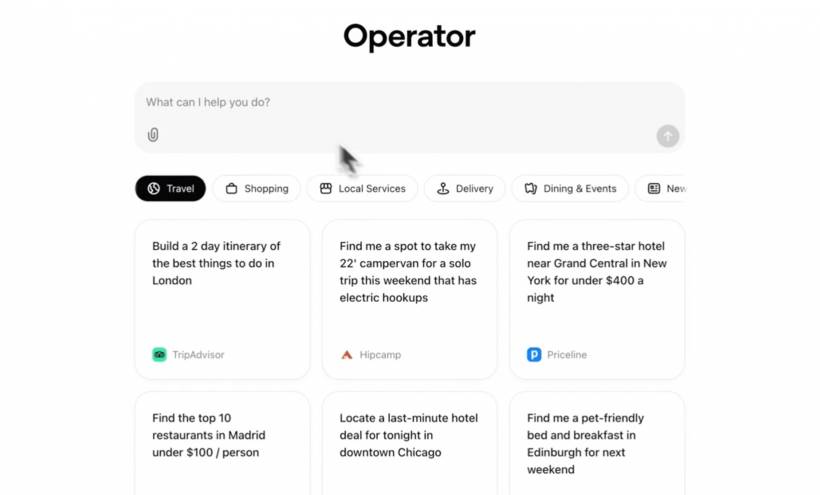OpenAI is introducing a new artificial intelligence tool designed to assist users with tasks such as booking flights, organizing grocery lists, and even making purchases. This tool, named Operator, is part of a growing trend of AI agents that perform tasks on behalf of users. According to OpenAI's announcement on January 23, Operator can handle a variety of actions by interacting with the web in a human-like manner—browsing websites, filling out forms, and clicking buttons.
OpenAI's Operator software combines its computer vision capabilities with advanced multi-step problem-solving to replicate human reasoning, the company stated. Bloomberg News first revealed OpenAI's plans for Operator in November. Initially, Operator will be available as a "research preview" to a select group of U.S. customers who subscribe to the recently launched ChatGPT Pro plan, which costs $200 per month. OpenAI aims to gather insights from early users to enhance the tool and intends to gradually expand access to more paying customers over time.
The launch of Operator aligns with a broader industry movement toward AI agents—software designed to handle complex, multi-step tasks with minimal human intervention. OpenAI's investor, Microsoft, along with competitors like Anthropic and various startups, have also introduced their own AI agent solutions.
Companies hope these AI-driven tools will help users save time on personal and professional tasks, fulfilling the long-standing promise of AI-driven productivity. OpenAI CEO Sam Altman has previously described AI agents as "the next giant breakthrough" in artificial intelligence.
During a demonstration on Wednesday, OpenAI's Vice President of Product, Peter Welinder, and Yash Kumar, the head of product and engineering for Operator, showcased the tool's capabilities. Operator was able to search for restaurant reservations and identify items from a handwritten list to facilitate an online grocery order.
Kumar mentioned that OpenAI has collaborated with several companies, including Instacart, OpenTable, Uber, and StubHub, to ensure that Operator functions effectively on their platforms.
During a demonstration, Kumar instructed Operator to book a 7 p.m. reservation at Beretta, a restaurant in San Francisco, via OpenTable. The tool launched a remote browser, navigated to the OpenTable website, and searched for the restaurant. Initially, it couldn't locate it because OpenTable was set to search within Iowa instead of California. However, since Kumar had previously configured Operator to prioritize searches within a specific San Francisco zip code, the AI automatically corrected the location and successfully provided a reservation for his approval. Kumar expressed optimism about Operator's potential, stating that it could evolve from handling simple tasks to more complex ones. He shared that he has personally used the tool for grocery shopping and booking tennis court reservations.
Operator is capable of handling multiple tasks at once. For instance, a user could ask it to find a Vancouver hotel with Peloton bikes in the gym and, while it's processing that request, also instruct it to search for an American Girl doll bed on Craigslist. Once a user has authorized Operator to proceed with a transaction—such as purchasing an item online—and has provided the necessary credentials and payment details, the AI should be able to finalize the purchase independently, Kumar explained.
OpenAI also intends to eventually make the AI model behind Operator available for developers to create their own AI agents. However, the company acknowledges the security and safety concerns associated with such technology, including the risks of errors and misuse. Mistakes made by an AI agent handling financial transactions could have more serious consequences compared to a chatbot providing inaccurate historical information. To address these concerns, OpenAI has designed Operator to reject certain tasks, such as those related to banking or activities deemed harmful. The tool will also prompt users to manually complete specific actions, such as logging into accounts, entering payment details, and solving CAPTCHAs.
Before making purchases, Operator is expected to seek user approval. Certain activities, such as drafting emails, will require user supervision, OpenAI stated.
Additionally, users can intervene at any point to take control of ongoing tasks or pause them if needed. "The user should always feel they're in control," Kumar emphasized.







Comments